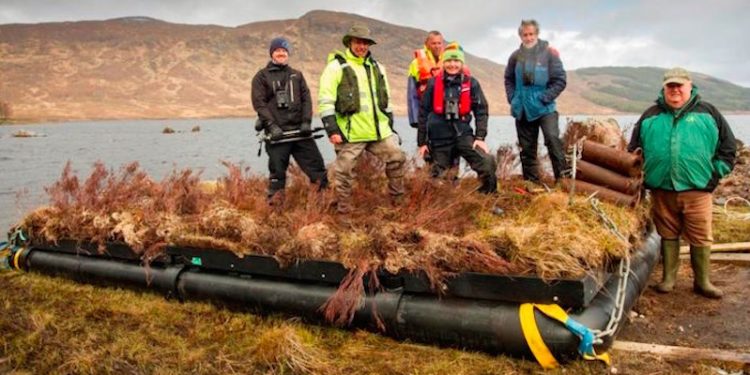One of Scotland’s rarest breeding ducks looks set to benefit from specially constructed floating nesting rafts manufactured by Fusion Marine from recycled fish farm piers.
In the UK, common scoters (Melanitta nigra) breed in only a handful of freshwater lochs in the northern Highlands and it is hoped that the supply of these two nesting rafts will provide safe new breeding sites for this scarce and declining duck species. The common scoter is on the Red List as a bird of high conservation concern, with only about 50 breeding pairs in the UK.
Working with the RSPB and Forestry Commission Scotland (FCS), Fusion Marine designed and manufactured the 7m by 3.75m rafts made from durable polyethylene and recycled plastic sourced from redundant fish farm pens.
Peat, turf and heather are placed on top of the rafts so as to create natural looking floating islands that will prove attractive for nesting and which are also safe from predators such as mink. The rafts will be sited on two lochs where scoters are known to breed.
It is envisaged that the rafts will also enable researchers to better monitor scoter breeding behaviour, which will enhance knowledge of their requirements and aid conservation efforts.
The project consortium is made up of the Forestry Commission Scotland (FCS), Scottish Natural Heritage (SNH), Wildfowl and Wetlands Trust, Scottish and Southern Energy (SSE), Blue Energy, the Ness & Beauly Fisheries Trust, the RSPB and Marine Harvest.
‘I am delighted that Fusion Marine took the challenge of helping the project develop and build a larger ‘island’ for use in the project. This was a critical part of completing the jigsaw to take the project forward,’ said Kenneth Knott of FCS.
‘The research showed that the problems associated with the scoters rearing their ducklings could be addressed, at least in part, by this new style of artificial island. The more robust construction includes extra flotation allowing for a deep habitat layer to be supported on the island without fear of sinking. We were pleased with the support from Marine Harvest in providing materials and from our two principal sponsors SSE and Blue Energy who have assisted with the finance, but principally to Fusion Marine for making ideas turn into reality.’
‘This initiative is a tremendous example of how a partnership of organisations from all walks of life can work together for the benefit of the natural heritage and we would like to express our gratitude to everyone who is involved. We very much hope that this experiment will yield the result needed to ensure the future survival of the common scoter in this part of Scotland,’ commented Corrina Mertens, operations officer for SNH in Lochaber.
Rhuaraidh Edwards of Oban based Fusion Marine added: ‘We have previously used our experience in polyethylene technology to manufacture rafts for nesting terns, which proved very successful. It is great that we have now been able to use such knowledge to help secure the future of one of Scotland’s rarest breeding ducks.’









